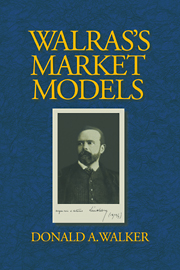Book contents
- Frontmatter
- Contents
- List of figures
- Preface
- Acknowledgments
- Introduction
- Part I The models of the mature phase
- 1 Walras's conception of a competitive market economy
- 2 The mature models: Not a normative scheme
- 3 The mature models of the barter of stocks of commodities
- 4 Institutions and participants in the model of monetary oral pledges markets
- 5 Disequilibrium and equilibrium in the model of monetary oral pledges markets
- 6 The structure of the mature nondurable consumer commodities model
- 7 The equilibrating processes in the mature nondurable consumer commodities model
- 8 The structure of the mature comprehensive model
- 9 The equilibrating processes in the mature comprehensive model
- 10 Walras and his critics on the maximum utility of new capital goods
- 11 The mature models of the money market
- 12 Iteration in the mature model of tatonnement
- 13 The mature model of the behavior of the entrepreneur
- 14 Walras versus Edgeworth on tatonnement processes
- Part II The models of the phase of decline
- References
- Collation of editions of the Eléments
- Index
3 - The mature models of the barter of stocks of commodities
Published online by Cambridge University Press: 05 May 2010
- Frontmatter
- Contents
- List of figures
- Preface
- Acknowledgments
- Introduction
- Part I The models of the mature phase
- 1 Walras's conception of a competitive market economy
- 2 The mature models: Not a normative scheme
- 3 The mature models of the barter of stocks of commodities
- 4 Institutions and participants in the model of monetary oral pledges markets
- 5 Disequilibrium and equilibrium in the model of monetary oral pledges markets
- 6 The structure of the mature nondurable consumer commodities model
- 7 The equilibrating processes in the mature nondurable consumer commodities model
- 8 The structure of the mature comprehensive model
- 9 The equilibrating processes in the mature comprehensive model
- 10 Walras and his critics on the maximum utility of new capital goods
- 11 The mature models of the money market
- 12 Iteration in the mature model of tatonnement
- 13 The mature model of the behavior of the entrepreneur
- 14 Walras versus Edgeworth on tatonnement processes
- Part II The models of the phase of decline
- References
- Collation of editions of the Eléments
- Index
Summary
Walras's models of the barter of stocks of commodities are described with regard to those features that determine and express the pricing and exchange processes – namely, their physical characteristics, participants, institutions, procedures, rules, and behavioral patterns. It is shown that Walras's arbitrage model is defective and that Walrasian arbitrage is not an equilibrating mechanism in the other barter models. It is also shown that they are complete functioning systems, that the numeraire does not simplify pricing in the models, that the pricing process in the models does not involve a central or particular-market authority, and that the models do not use or logically depend on the assumption of large numbers of traders.
Introduction
This chapter has the general objective of describing and evaluating the processes of pricing and exchange in the models of the barter of fixed total stocks of commodities that Walras presented during the mature phase of his theorizing. Walras placed these models at the beginning of the series of lessons on markets in the Eléments. The models were intended by him to display fundamental and elemental features of market behavior, as though they are logically antecedent to markets in which money is used. In fact, as will be seen, Walras took most of the characteristics of the barter markets from organized monetary markets, and his assumption of barter, as will also be seen, created situations that are not simpler but more complex than those found in monetary markets.
- Type
- Chapter
- Information
- Walras's Market Models , pp. 53 - 75Publisher: Cambridge University PressPrint publication year: 1996



